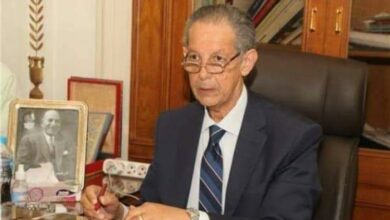Representatives of the liberal Wafd Party and the Muslim Brotherhood’s Freedom and Justice Party, the two biggest players in the Democratic Alliance, butted heads on Sunday in a meeting to decide to what extent the two parties will abandon the alliance.
Another meeting was to be held later that day to decide the fate of the other 32 parties in the alliance, which was supposed to run as a bloc in the upcoming parliamentary elections slated for November. Some of the parties may join the Wafd on their party lists, and others may join the Freedom and Justice Party.
Many had questioned the alliance between the disparate parties since it formed in June. Now it seems on the brink of implosion over disagreements about the upcoming election.
Essam Shiha, a member of the Wafd’s high council, confirmed to Al-Masry Al-Youm that there would be no coordination between the Wafd and the Freedom and Justice Party in the list-based portion of the parliamentary elections, the initial reason for the alliance.
The alliance had been seen to be beneficial for the Wafd because its candidates would run with the Freedom and Justice Party on the same electoral lists, thus increasing their chances of success.
However, there is still confusion over the nature of the split and whether it has been officially adopted by the Wafd.
On 29 September, Wafd leader al-Sayed al-Badawy convened a meeting of the party’s high council to reaffirm the electoral alliance with the Brotherhood. He then unilaterally dismissed the alliance later that day, according to Shiha, which led to speculation that the decision is not yet official.
This happened as political forces in general pressured the Supreme Council for the Armed Forces (SCAF) to make further amendments to the parliamentary law over the weekend, culminating in a meeting with Armed Forces Chief of Staff Sami Anan, the second highest ranking member of SCAF, on Saturday.
A document was issued after the meeting in which the SCAF agreed to abolish Article 5 of the law, which stipulated that candidates with no party affiliation can run for the one-third of seats that are to be elected by a single-winner system.
The parliamentary law, after an amendment, has placed two-thirds of the seats within the scope of the party list system, with the final third for individual candidates.
Shiha stated that there would continue to be an alliance for the Wafd, not just with the Freedom and Justice Party or members of the Democratic Alliance, but with all political parties, regarding the single-winner seats, now that Article 5 has been removed.
“There will be a political alliance in the single-winner lists, wherein parties will not run individual candidates against each other,” he said.
Another possible reason put forward for the disintegration of the alliance was the Freedom and Justice Party's objection to the Wafd's alleged practice of enlisting members of the now-dissolved National Democratic Party to help make gains in the election, a claim refuted by Shiha.
Meanwhile, members of the Wafd Party felt that it was the Brotherhood's undeclared opposition to Egypt becoming a civil state that forced the alliance to crumble.
Previous Al-Masry Al-Youm reports indicated the approval of some Wafd members for the end of the alliance with the Freedom and Justice Party, which was felt to compromise the party’s liberal values.
The independent newspaper Al-Shorouk reported that the reason behind the split was that the Freedom and Justice Party and the Wafd had agreed to each run in 35 percent of the allotted seats in the party list system, with the other parties in the alliance contesting the remaining 30 percent.
When the Wafd attempted to bring more liberal parties into the alliance, the Freedom and Justice Party insisted that they were to be taken into the Wafd's allocation, leaving the Brotherhood’s 35 percent untouched, according to Al-Shorouk.




